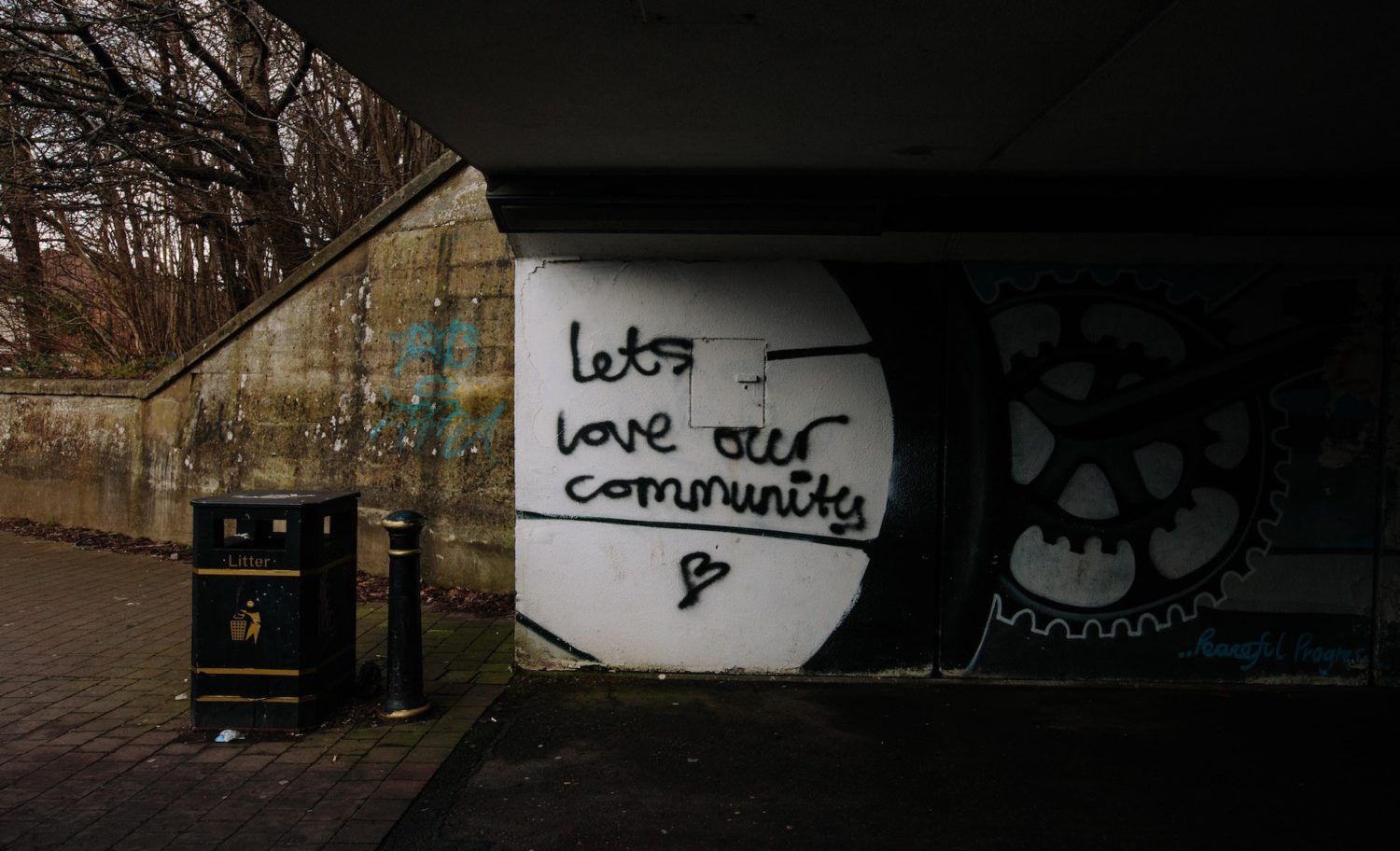Mutual aid is for life
Oly Durose sets out how to win the unwinnable, one act of solidarity at a time
“I don’t believe in charity. I believe in solidarity.” Eduardo Galeano
In the midst of the coronavirus crisis, thousands of self-organising volunteers provided invaluable care and assistance to those experiencing illness and isolation in their neighbourhoods. From grocery shopping to medication collection, dog-sitting to dog-walking, lawn-mowing to rubbish disposal, and from friendly chats to mental health support, local networks of mutual aid mushroomed in local communities up and down the country. Almost two years on, however, and the energy underpinning these systems of collective care has waned. So too, has cross-party applause, which faded as quickly as it appeared. For many, mutual aid was an urgent but temporary response to an anomalous crisis. But for those who were providing community care long before coronavirus, mutual aid is anything but momentary. Instead, it represents the lasting struggle for a radically new way of life.
Anarchists assemble?
Many of those who engaged in mutual aid during lockdown may be surprised to know that they were practising a longstanding anarchist tradition. In his collection of anthropological essays Mutual Aid: A Factor in Evolution, anarchist philosopher Peter Kropotkin explains how localised networks of co-operation have played a crucial role in the maintenance of the human race. The relationship between mutual aid and collective survival is perhaps no more palpable than in the context of a global pandemic – where my health is dependent on yours, and yours on mine. As Dean Spade (another self-proclaimed anarchist) testifies in his book, mutual aid is a deeply political act. Stemming from an awareness that our existing systems cannot satisfy human needs, mutual aid showcases how alternative systems, grounded in unconditional and universal support, are better for everybody.
All the more fascinating, then, to see these apparent acts of anarchism spread to terrain famous for fiercely upholding the status quo. I am from Brentwood & Ongar in Essex, a relatively affluent and suburban constituency that has been safely Conservative since its creation in 1974. During the run-up to the 2019 general election, it took us more than three months to get barely 500 people to like our local Labour campaign’s Facebook page. By contrast, when a few of us decided to create a Covid-19 mutual aid group in March 2020, it took just 24 hours to attract 1,000 members (the total now exceeds 2,000), who were all seemingly acutely aware that the dispersed suburban terrain generated an alienating lockdown experience for the elderly, the disabled, and those in less accessible settings.
Initially, I found the discrepancy frustrating. Why were suburbanites suddenly so keen to address suburban inequality and isolation – the very issue that we had spent the past eight weeks bitterly – and unsuccessfully – campaigning against? It wasn’t long, however, before I began to understand how voters could have decisively rejected a platform of collective care one month, and then decisively rejoiced in actively building one the next. It was a realisation that, in the end, not all systems of mutual aid are created equal.
Suburban solidarity
Near the beginning of our mutual aid experiment, we agreed that assistance would be given on the following principle: if you asked, we helped. No data was gathered, no identity was checked, and no means were tested. Soon, however, many in the group began to betray, rather than reflect, the universalist principle of mutual aid. Namely, acts of solidarity had eroded into expressions of charity. Vertical modes of decision-making emerged to allow a few people at the top to decide which of the most vulnerable in the constituency was eligible for – thus worthy of – support. And certain sections of the community – in particular homeless people and the Traveller community – were demonised as members of the undeserving poor.
This might explain why many Conservative suburbanites (including councillors) who oppose radically redistributive platforms could also engage in (a distorted version of) suburban mutual aid. That’s because, in Brentwood at least, the descent of mutual aid into conditional, charitable and profitable assistance legitimised their dual belief that assisting the least fortunate is a virtuous display of voluntarism, but not a responsibility any collective body should bear. This leaves us with the following paradox: how do we maintain and augment the resurgent enthusiasm for mutual aid in Tory suburbia – and in fact right across the country – without betraying what mutual aid is all about?
I do not have a definitive solution to this dilemma, but I do have the following conviction: experimenting with mutual aid is not about developing forms of assistance that Conservative suburbanites are most comfortable with. It is about showcasing the workability of collective structures. Mutual aid should still welcome donations from wealthier suburbanites, but they should not have asymmetric power in deciding who gets support. Besides, mutual aid in Tory suburbia is not necessarily dependent on donations from the wealthy for expansion. Let’s think creatively – for example, can we combine mutual aid with a unionisation drive? By affiliating with mutual aid groups, unions could represent the interests of those who both provide and are reliant on the service, making redistributive demands of employers on their behalf. Any progressive party should provide mutual aid with financial support too, as well as encouraging activists to get involved on the ground.
The role of the Labour party, however, goes well beyond immediate assistance. That’s because expanding mutual aid in Tory seats is not just a challenge. It is also an opportunity: to garner widespread support for a radical electoral platform in otherwise hostile territory.
Upscaling mutual aid
“We are going to Tredegarise you.” Nye Bevan, 1945
Before the NHS, healthcare was bought and sold. Those who couldn’t afford doctors relied on charitable services provided by the church, or run-down hospitals set up by local governments. Taking matters into their own hands, workers across England and Wales formed ‘friendly societies’, which pooled together small portions of their income to pay for doctors and to establish free clinics. One of the most advanced systems was the Medical Aid Society in Tredegar, South Wales, in the early 20th century. Clinics grew into full-time services that provided healthcare not just for workers but for their families and communities too. It was not until the end of the second world war that Tredegar’s model was adopted across the country. “I am determined to extend to the entire population of Britain the benefits we had in Tredegar for a generation or more.” Those were the words of Tredegar-born Nye Bevan, the minister of health in the post-war Labour government. A few years later, he helped establish the National Health Service to make healthcare freely available to all.
The NHS, then, was not created by the Labour party out of thin air. It was built on the foundations laid by those who knew what it meant to look after each other, long before the electoral system caught up. More than 70 years later, we are once again lagging behind the collective mood. To ensure the resurgent energy does not go to waste, the Labour party should vow to scale up mutual aid services. Inspired by local communities who have been providing food, prescriptions and friendly phone calls to isolated residents, a Labour government could (for example) establish a National Food Service, set up a Universal Prescription Service, and provide counselling and companionship as part of a National Care Service.
Mutual aid has awoken entire communities to the idea that it is better to deal collectively with problems that affect every individual. As long as we stay firm on our principles of solidarity, then mutual aid can showcase the workability and preferability of a society grounded in collective care. This is our chance to garner widescale support for a radical electoral platform, grounded in the belief that local communities should have the power and resources to meet everybody’s human needs on a democratic, unconditional and universal basis. This is our chance to turn the safest of Tory seats red by cultivating acts of solidarity on unlikely soil. This is our chance to build a society in which people give what they can and take what they need.
Image credit: Mike Erksine/Unsplash

